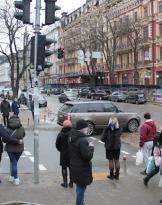Damascus is considered the oldest inhabited city on the planet; the first settlements date back to around 11000 years ago.
It is magnificent and chaotic at the same time, teeming with life, smelling of incense and spices and of every single building in the old city it would be possible to write a treatise.
Damascus today is also the capital of a state in war: check point capillaries along the main access roads, armed soldiers on the streets intent on searching bags and bulky packages, the echoes of detonations as distant storms.
Nevertheless life continues as if nothing had happened, in spite of the inconvenience to circulation and fear: children go to school every day, employees rush to work, shopkeepers open their shops, muezzins call to prayer as they do the bells of the many Christian churches; yes, because Damascus has always been a multicultural and ecumenical capital, in which all religions have always had citizenship, so much so that it is reprehensible even to start the question.
 Here Christians, Sunnis, Shiites and Jews have been living in harmony ever since without facing each other's problems: on the street we meet women with hijabs, chadors, with mecomes in the wind, groups of boys and girls belonging to the most varied confessions that spend time together having fun and without caring about one another's spirituality.
Here Christians, Sunnis, Shiites and Jews have been living in harmony ever since without facing each other's problems: on the street we meet women with hijabs, chadors, with mecomes in the wind, groups of boys and girls belonging to the most varied confessions that spend time together having fun and without caring about one another's spirituality.
All as before, in short, or almost.
In this context so controversial, but all in balance, however, there is a great absence, a presence that manifests itself in every corner for its absence.
It is one of those factors that are so macroscopic that when you can identify it, you have to beat the palm of your hand on the forehead.
Obviously tourists are missing in this city; those dangling crowds, often horribly dressed, armed with camera and mobile phone used to wander around the city as hunters during a safari, but which in turn were easy prey for the most fearful of predators or the Arab merchant.

The first, as we said, were "extinct" after the outbreak of war, leaving the latter without the main source of livelihood, accompanied in this slow and inexorable agony by restaurateurs, hoteliers and in general from all that industries that from tourism mass derived vital lymph.
Every day shopkeepers, artisans, carpets sellers, restaurateurs, hoteliers raise their business gate knowing that during the whole day they will hardly cross their dark and deep eyes with the light or almond eyes of tourists coming from the most varied corners of the planet.
And so they stand there, father and son, all day to hammer into marvelous inlaid objects; or there are those two brothers intent on polishing with shellac wonderful boxes made of wood and mother-of-pearl; and then there are all the others or those who put collanine, unroll the carpets, clean the wonderful Arab gardens of the hotels from the leaves, set up the tables or arrange the hookahs in a row; in the evening, all these activities, daughters of custom rather than necessity, leave room for backgammon or chess games between nearby shopkeepers or the more common drinking of tea or smoking in the company.

The collections are almost always scarce if not absent and the families, day after day, tighten the belt more and more.
We Italians, who have made mass tourism one of the main industries of the country, we should understand more than others the damage that this absurd civil war is going to one of the most beautiful countries in the Middle East and the whole world, which boasts unique pearls like Damascus, Palmyra or Aleppo.
We who with our ignorance have allowed all this to happen, but then complain about the waves of refugees that fall every day along our borders.
Until six years ago nobody thought of abandoning Syria and many still today, despite the crisis and devastation, wish to stay to rebuild that peace and harmony that lasted for many years.
Of course, there were problems, as in all those countries with a long history, strategically positioned on the globe and the borders created with a pen stroke; but the most common answer to the question "what would you do if you had a magic wand" is the same for everyone: "I would like to go back six years ago".


 (photo of the author)
(photo of the author)












